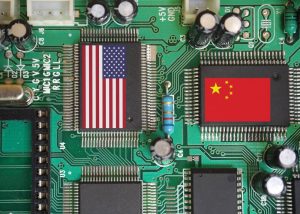Join Our Telegram channel to stay up to date on breaking news coverage
Artificial Intelligence (AI) is the current focus for technologically inclined companies. However, China has struggled under the weight of U.S. sanctions to leap ahead in the AI market.
Currently, the Chinese depend on the development of home-grown AI technology in a bid to cope with U.S. sanctions.
Wall Street Journal reports that the U.S. sanctions on China have forced Chinese tech giants to look within for progressive AI research. According to a review of research papers and interviews with their employees, these companies focus on strategies to develop and improve AI.
However, they intend to complete this process with fewer conductors and eliminate total reliance on a particular type of hardware.
Chinese Working Around U.S. Imposed Restrictions
According to a report from the Wall Street Journal, Chinese companies are researching methods to develop AI using weaker semiconductors combined with chips. They hope to overcome their previous dependence on a particular type of hardware and discover other viable alternatives.
The U.S. imposed sanctions have denied China access to advanced chip technology in the market. These chips include Nvidia’s A100 chips and the H100, which is the latest version. These two chips are the most popular and widely used for AI development.
Presently, Chinese developers can only access the Nvidia chips A800 and H800, which only support small-scale AI models. According to Reuters, the U.S. sanctions are on the Nvidia Corp chips and Advanced Micro Devices Inc. Chips, the best standard for AI and chatbot development.
However, Nvidia created variations of its chips to comply with U.S. rules for the Chinese markets. The Nvidia H800 is one of the chips still accessible to the Chinese and takes 10%-30% longer to complete AI tasks. Also, the slower output of these chips will double some costs compared to the faster U.S. chips.
Despite the limitations, the slowed Nvidia chips are still an improvement for Chinese tech firms. Tencent Holdings, a major Chinese tech company project, said that systems using the Nvidia H800 chips would reduce the training time for its largest AI from eleven to four days.
Although the U.S. imposed these sanctions on China, they carefully set rules to prevent the Chinese from discarding U.S. chips totally to focus on their chip development efforts.
The restrictions affect the chip’s ability to calculate precise numbers and reduce chip-to-chop transfer speeds, which affects AI.
However, indigenous tech companies in China are increasing their research into AI development.
Alibaba Frontrunner In Chinese AI Development
The Chinese e-commerce global giant, Alibaba, threw its weight behind AI research in April 2023. They announced plans to launch a product similar to ChatGPT in the future.
BBC reports that the new product is Tongyi Qianwen, which translates to ‘seeking an answer by asking a thousand questions’ in English.
Alibaba hopes to integrate this chatbot with its tech businesses, including its workplace app DingTalk and voice assistant Tmall Genie. Also, this chatbot will be fluent in English and Mandarin at its first stage.
According to the report, its abilities include converting conversations to written notes and writing emails.
But Key Figures Raised Concerns About AI Training

Elon Musk and other top executives signed an open letter pointing at the risks of developing AI systems too fast. Musk believes that the training of AIs above a certain capacity should be on hold for at least six months. Steve Wozniak, Apple’s co-founder and researcher at DeepMind, also signed the letter.
These individuals believe developing AI technology too fast with human-competitive intelligence can be risky for humanity and society. However, Arvind Narayanan, a professor of computer science at Princeton, thinks otherwise. He believes that the tech leads focused on speculative futuristic risks while ignoring the problems people face.
A lead developer of AI technology, OpenAI, warned of the risks involved in developing AI technology recklessly. They believe a malfunctioning super intelligent Artificially Generated Intelligence (AGI) could potentially harm the world.
Elon Musk was a co-founder of OpenAI but resigned a few years ago, criticizing its direction.
AI And The Job Market
Goldman Sachs and investment banks believe that AI could replace over 300 million jobs in a short while. According to the report, Generative AI will create content similar to human jobs.
However, the UK government seems keen on the AI drive stating that they would promote investment in AI to boost economic productivity. Also, they reassured the public that AI would complement jobs rather than disrupt the entire structure.
The report noted that AI’s impact varies across different sectors, stating that about 46% of tasks in administrative and 445 in legal professions can be automated. However, they believe that only 6% of jobs in construction and 4% in maintenance can be automated. Also, BBC News reports some artists expressing concerns that AI development could hurt their business.
Ultimately AI advancement might translate to fewer wages since the technology completes tasks efficiently.
China To Review AI Services
Chinese Authorities hope to enforce a new security review mandate for Generative AI services before they go public.
This announcement followed after a leading tech giant in China, Baidu, launched its new AI Chatbor Ernie in March 2023. This chatbot hinges on an AI-based deep learning model. Ernie is an acronym for ‘enhanced representation through knowledge integration.’
Join Our Telegram channel to stay up to date on breaking news coverage


